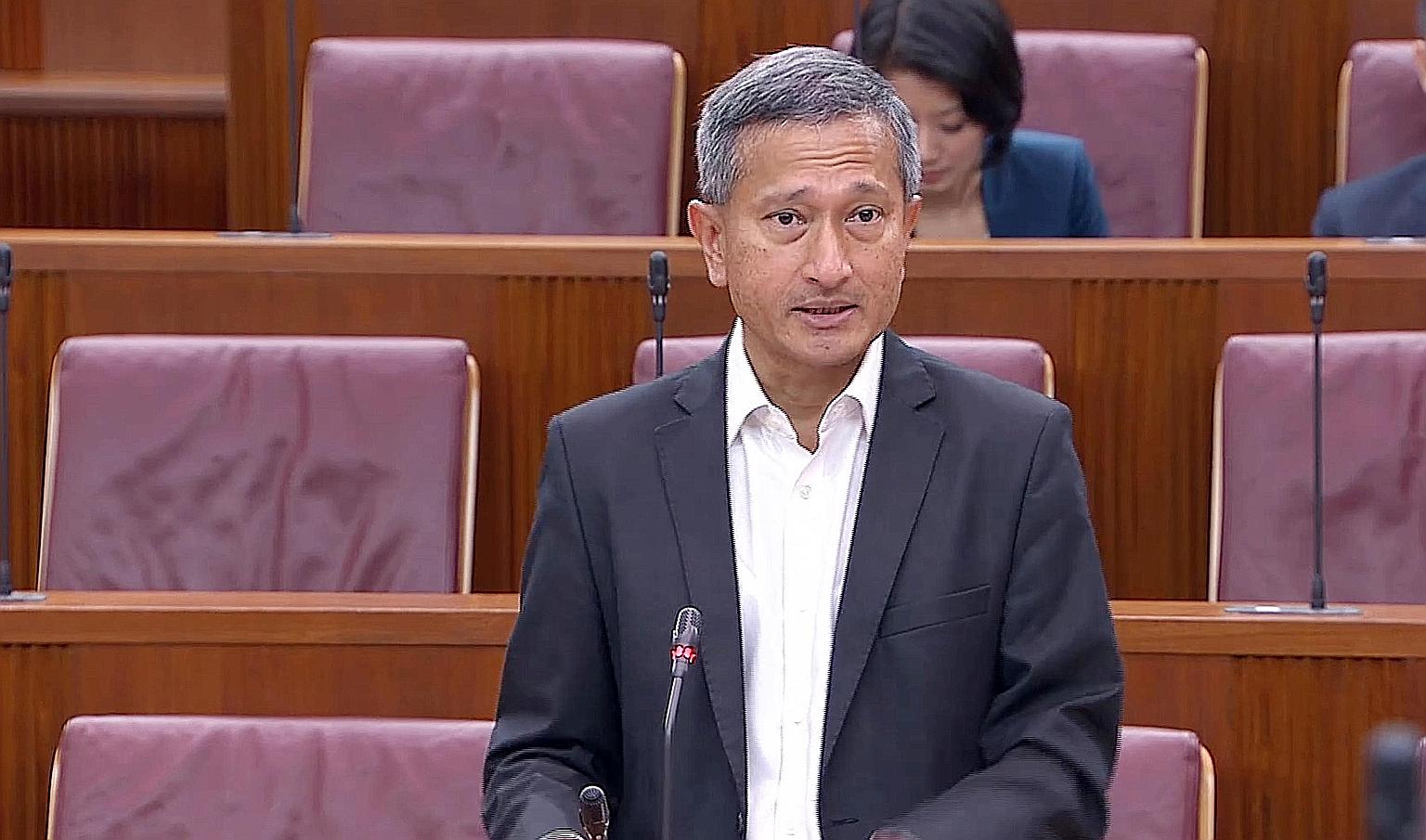S'pore to deepen ties with both US and China, rather than choose sides
Sign up now: Get ST's newsletters delivered to your inbox

Foreign Minister Vivian Balakrishnan
Even as major power competition intensifies between the United States and China, Singapore has to avoid choosing sides and instead find ways to deepen and enhance cooperation with both parties.
Foreign Minister Vivian Balakrishnan said this yesterday, as he sketched out Singapore's foreign policy towards the world's two foremost powers during the debate on his ministry's budget. "We must find ways to deepen and enhance our cooperation with both China and the US, including in new areas of mutual interest, and encourage all parties to act in accordance with international law," he said.
While Singapore might find itself "squeezed in the middle", he emphasised that the country wants to be friends with both powers - and not be caught in the crossfire or seen as taking one side or the other.
"Both the US and China must know that although we want to have good relations with both, we do not do things at their behest," he said. "Ultimately, we act in a principled way and we will only do what is in the best long-term interests of Singapore citizens."
Mr Vikram Nair (Sembawang GRC) had asked how the Government would balance relations with both sides, given their intensifying rivalry. Replying, Dr Balakrishnan said the key variable in this equation was the bilateral relationship between the US and China.
Both countries are locked in a bruising trade war and although a phase one trade deal was inked in January, thornier issues relating to structural changes to China's economy have not been dealt with, and left for later.
Both sides have to make "strategic choices" moving forward, he said.
On its part, the US has to decide how it wants to deal with China.
"It can work with China in the global order, get China to participate within a rules-based system and compete with China on a fair basis, or the US can strive to remain the dominant power in all arenas, in all areas, at all costs and seek to arrange international rules so as to limit China's power and influence," he said.
China, on the other hand, has to decide whether it wants to be a "benign superpower, welcome and respected by other countries", as it seeks to increase its influence.
"If so, China must be willing to make adjustments to participate within the international rules-based system and give space to others, especially other small countries," Dr Balakrishnan said, adding that not doing so will seed resentment and pushback.
MPs such as Mr Baey Yam Keng (Tampines GRC) and Ms Tin Pei Ling (MacPherson) asked how Singapore would deepen relations with either side.
Dr Balakrishnan noted that the US has helped build a rules-based global order that has been a formula for peace and prosperity.
Singapore has been a "clear beneficiary" like many other emerging economies, and continues to believe in upholding such a rules-based system, even though it recognises that "some of the rules" need to be updated, he said.
The US continues to maintain its ties with the region and is the largest investor in Singapore, he said, noting that both countries had renewed a key defence pact last year.
As for China, both Dr Balakrishnan and Minister of State for Foreign Affairs Sam Tan pointed out that Singapore has been China's largest foreign investor since 2013. This year also marks the 30th year since Singapore and China established diplomatic relations, he said.
The deep relations between both sides are being kept up even as Singapore's 4G leadership takes over the reins. "I'm confident that our fourth-generation leaders are continuing to strengthen our friendship and trust between our two countries," Mr Tan added.
In his speech, Defence Minister Ng Eng Hen said the US Department of Defence has made it clear that the Indo-Pacific is now its priority theatre because of China, which the US deems as a "strategic competitor" and "rival power".
It is putting that policy in practice, Dr Ng noted, by moving more ships, planes, other equipment and troops to its bases in Japan and South Korea, on top of the 78,000 troops already stationed there.
Meanwhile, the expansion of China's People's Liberation Army has gained momentum and its navy is now the world's largest in terms of number of ships, he said. The US' recent statements and moves are likely to accelerate, not slow down, the pace of PLA modernisation, he noted.
Singapore watches these developments closely, Dr Ng said, trying to preserve space for itself, to maintain its sovereignty and pursue its own interest. "We have no desire to take sides or be caught in the crossfire. So far, we have maintained independence and space for ourselves, but as contestation increases in this region, it will be increasingly difficult to do so."


